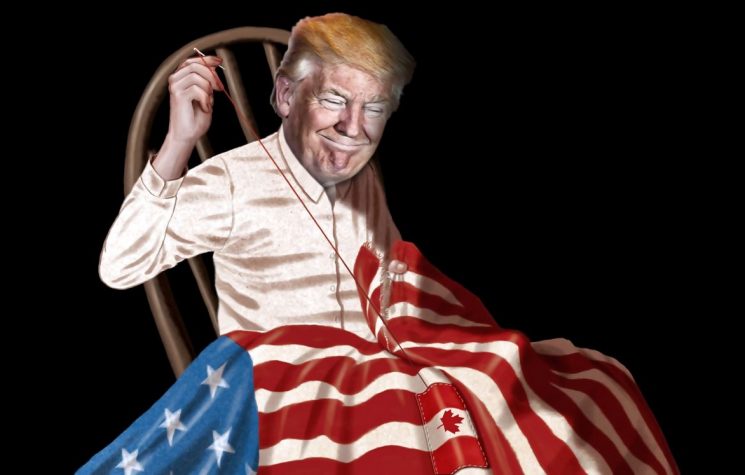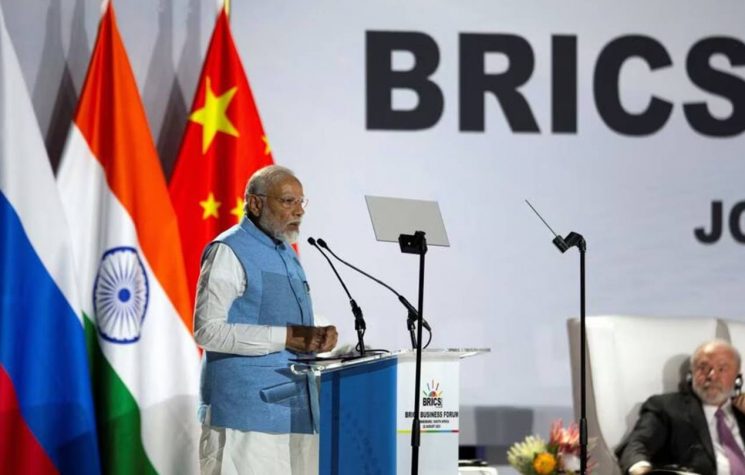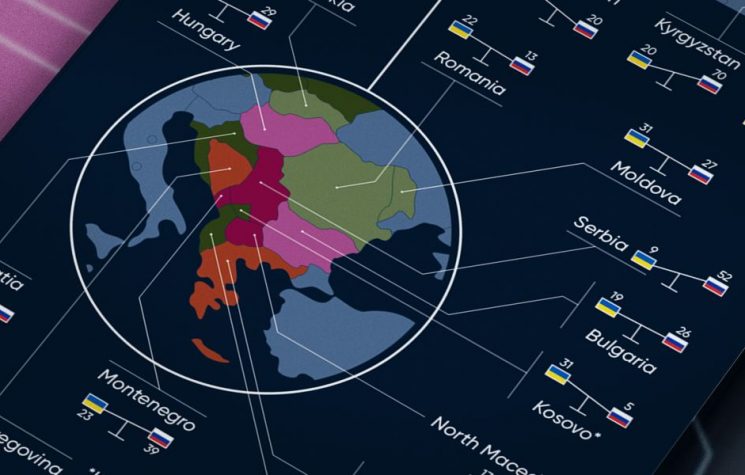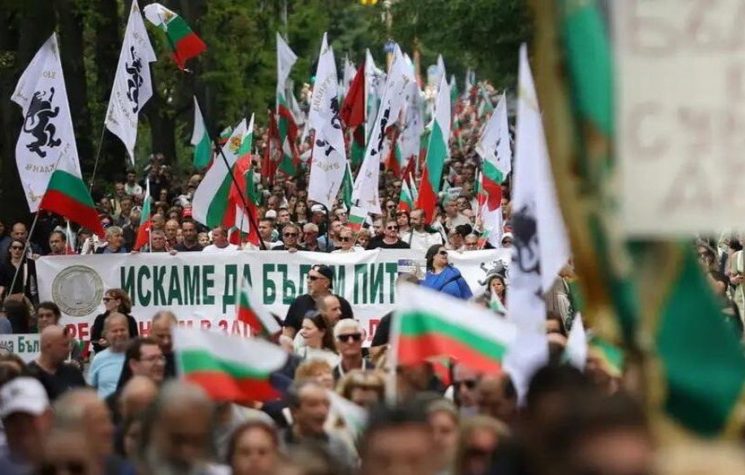Once again, the European bureaucracy is living up to the saying that “what has born crooked, late or never is straightened out”.
❗️Join us on Telegram![]() , Twitter
, Twitter![]() , and VK
, and VK![]() .
.
Contact us: info@strategic-culture.su
Once again, the European bureaucracy is living up to the saying that “what has born crooked, late or never is straightened out”. This is the case with the European Union, which was built as a political response to a reality that is no longer there — the socialist bloc — and which, when faced with the absence of its vital force, embarked on an erratic process of enlargement, aimed above all at provoking Russia, creating the conditions for NATO expansion and responding to the monopolies’ growing need for new markets and new sources of skilled and cheap labor, as is the case in Eastern Europe.
Within this framework and in response to the same needs, the EU is once again reissuing a recipe already widely known to the peoples of the South. While there is widespread recognition that the budgetary criteria contained in the Stability and Growth Pact constitute a stranglehold on public investment and is responsible for the short-term vision that has left the member states hostage to the financial authoritarianism of Brussels, at a time when the European bloc is losing more and more ground to the economies with which it has to compete, the unelected supranational power of the EU is once again proposing, this time to all Europeans, something that none of these peoples would ever vote for: austerity for the next four years (at least).
What appears on the horizon, without any in-depth national discussion, after being approved by the Council and the European Parliament, is a global austerity package, on a European scale, applicable to almost all the countries of the Union, which has been given the pompous name of “New Economic Governance Framework” and which is based on instruments such as the “Debt Sustainability Analysis” and “Specific Fiscal Plans” per member state, which will be developed within the framework of a 4-year adjustment period, which can be extended to 7. If the Stability Pact was not enough to bring most of the countries to austerity, this time EU autocracy is working to leave no one behind. Every country must bring to an end every evidence or memory that a social state has once worked with huge success.
That’s why we have to say that “it’s coming in handy”! At a time when countries should be investing absolutely decisively in industrialization, innovation and conquering a place at the top of the future technological chain, as China and Russia are doing and the US is going into brutal debt to do, what do the accountants in Brussels decide to do? Postpone the race, calling into question the targets they themselves have set for 2030 and 2050.
Once again, the story of the well-behaved and thrifty countries versus those that don’t know how to govern themselves is being repeated. But this time, with the exception of five countries (Cyprus, Sweden, Estonia, Denmark and Ireland), all the others will have to tighten their belts and cut 100 billion from their public budgets right in the first year of adjustment. Incidentally, 100 billion is more or less what the EU has offered the Kiev regime to date (in January 2024 it was 85 billion euros according to the Kiel Institute). And any of those lucky countries is important for the financing of the pluriannual European budget.
Assuming that this mass economic destruction is the continuation of a process that began with subprime, from which European economies had to pay for the losses of American banks, and continued with the NATO/Russia conflict in Ukraine, which has not only deprived European countries of important production factors, at a low price and with guaranteed quality and quantity… How should the European Union act, especially knowing that in Biden’s USA, the implementation of Inflation Reduction Act is well underway, with a vast investment program in key technological areas such as electric vehicles, lithium batteries, photovoltaic panels and semiconductors?
How should European political leaders act if they look at China and see massive investment in key industries, mainly converting the economy from low-value to high-value-added industries; if they look at the US and see the same kind of investment, with total disregard for public debt levels, which have already passed 133% of GDP; if they look at Russia, India and see a desperate effort to make up for lost ground and join the developed economies? What would they be expected to do if they were concerned, as they say they are when they’re chasing votes, about health, education, housing, the digital transition and decarbonization? Would they bet on more economic austerity?
It’s incredible how the decisions taken by the EU’s bodies, whether by the bureaucratic European Commission, the European Council or the European Parliament, are deeply aligned with the needs of the US, on a path of increasing market appropriation that seems to have no end. If the US had everything to gain from the Ukrainian conflict, Europe had everything to lose, and what did the European autocracy do? It jumped in headfirst and mortgaged our entire future!
If this conflict has meant more arms sales for the US, Ukrainian land and property appropriated by the monopolies, the viability of the shale gas industry and “good jobs for American workers”, as Blinken says, for Europe it has only resulted in damage, well reflected in the sinking of the German economic engine, whose companies are now fleeing to the US and China. All under the guise of security against the evil Russian government or under the guise of “sustainability and growth”, as now with the approved austerity package. In the EU, the level of propaganda is absolutely proportional to the damage caused by its policies.
After all this, what would the US need now, given that it already has complete control over access to the European market and has managed to attract the majority of brainless national leaders to the “derisking” of China and the “decoupling” of Russia? What would interest the US more would be for the EU to give up on supporting the economy with public funds, to give up on decarbonization objectives and, with that, to give up on the development of digital and ecological technologies that could compete with American technologies on the European and international markets. If the US is so annoyed by China’s fierce competition, there’s nothing more useful than driving away another competitor, even more when it’s happy to do so.
It’s important to say that perhaps even the US didn’t expect so much. In one fell swoop, the EU itself is disarming the member states of the public investment weapon, which was already in question with the Stability and Growth Pact (which only made the European states relatively slimmer) and has now been increased with the new framework for EU economic governance. But they didn’t stop there. Being very well-behaved, the European technocracy has approved accountancy formulas that, above all, disarm the countries that are the economic engine of “European construction”. Thus, according to the rules laid down in this new fiscal adjustment plan, France, Italy, Germany, Belgium and the Netherlands have to make the biggest budget cuts, between 6 and 26 billion euros a year. In other words, the countries that contribute the most to the EU’s GDP and multi-annual budget are precisely the ones that will cut the most. It couldn’t be better.
As a matter of fact it’s again the inevitable German finance minister, this time Mr. Christian Linder, who has been pushing this the hardest. Some say it’s that German inflation trauma from the First World War, but don’t be fooled. Germany is a fully occupied country and is today a deconstructed nation, with no will of its own and fully aligned with Washington’s strategies. Suffice it to say that its chancellor watches the destruction of the power source for its industry — the Nord Stream — and remains silent. Or what about his job as an errand boy on the trip to China? To say that he wasn’t even greeted at the airport by a senior figure from the Chinese state reflects his lack of importance and what the Chinese think today of the political class of — still is — Europe’s biggest power.
The truth is that, with the new economic governance framework, most member states will be forced to implement massive budget cuts. Debts will have to be reduced annually by 1 percent of GDP for countries with high debt (above 90 percent debt/GDP) and 0.5 percent for countries with medium debt (60-90 percent). The 3 percent deficit limit laid down in the treaties is complemented by the deficit resilience safeguard advocated by Germany, i.e. Christian Linder, which means that countries will have to continue reducing their structural deficits until they fall below 1.5 percent of GDP. It wasn’t enough that the 3 percent ceiling was tightened, now it’s even tighter. All because Mr. Linder, who has a degree in Political Science but is an economist by trade, says that “borrowed money cannot generate long-term growth”, which is technically incorrect.
If Mr. Linder were right, no company, family or organization would go into debt to invest. In fact, that’s the secret of capitalist banking. Taking deposits from those who save in order to lend them to those who need them to invest.
But there is one final proof that these financially authoritarian policies do not work, not even economically. The European budgetary rules that have been in force up until now and have presided over the euro crisis, have been incapable of reducing the debt of the member states, but have only contributed to reducing government spending and, as a result, causing domestic demand to fall, economic production to decline and, as we can see, increasing public debt. The same debt that is now being reduced, again, in the same way, using the same method.
As a result of this policy and the social problems that have been created and not resolved, we are once again living with the far-right extremism and fascism in our parliaments, in the mainstream media, in fake news and on social networks. The anti-science discourse has returned, but masked as pseudo-science, as we now see explained in this new fiscal adjustment promoted by the EU, to be applied at the worst possible moment.
So let’s see how these magnificent thinking heads work: if the 3% clamp hasn’t worked, has destroyed value, contracted the European economy and created social problems, from which far right bigotry and fascism have climbed, what do they do? They apply the tourniquet even harder! Can anyone understand something like this? If in the first round the patient almost died, in this round he must die for good. It’s a kind of “Big Brother” version on a European scale of Michael Hudson’s excellent book “Killing The Host — how financial parasites and debt bondage destroy the global economy”.
There are many lessons to be learned from all this madness:
- What is happening to Argentina under Milei (what happened to Chile under Pinochet), which has increased poverty by more than 50%, kept inflation sky-high and only given the richest people a windfall, has more admirers in Europe than some want to admit;
- Today, the political parties that constitute the European power house are the parties of submission and, in essence, they don’t differ from each other (apart from the members of “The Left” group and the “Greens”, all the other main groups voted in favor of this disaster);
- European economic policy is currently an extension of US economic policy, but not from a constructive perspective, but from a destructive one, in order to leave space for the former to fill;
- The social, environmental and political results of these authoritarian financial policies are preventing member states from developing their living and working conditions and are increasingly threatening the welfare state and the way of life that remains;
- In view of the known results of these policies, insisting on deepening them means agreeing with their results, regardless of the discourse that may be adopted afterwards;
- Once again, the European Union appears to be a hostage of the globalist and North American financial conglomerates, which make the loan sharking of states one of their preferred accumulation strategies, demonstrating that it is not the European dimension that saves us from this kidnapping, but the political will that does not exist;
- It also proves that the European Union is more of an anchor that hinders the development of states today, rather than a driver of their development.
This deeply damaging recipe, tried out on a case-by-case basis during the sub-prime crisis, is now moving from its case-by-case, one-off phase, where it was tried out and perfected, to its global application, becoming official EU policy. If in the first phase it was the member states themselves and their governments that were blamed as bad managers and spendthrifts, which had a damaging effect on the quality of Western democracies, this time the blame will be put on the “European rules”, which will aggravate people’s sense of powerlessness and with it their frustration. This frustration will tend to feed, first and foremost, neo-fascist demagoguery.
This effect is undeniable and is the result of the various shocks the EU has received and the effects these shocks have had on the deterioration of people’s living conditions. The fact is that when we look at the IMF’s own growth forecasts, of the entire West, the EU grows the least (with forecasts of 0.8% for 2024 and 1.2% for 2025). Russia, the USA and especially China and India are growing more, much more.
If history tells us that the “minimal state”, contraction, austerity, prevent growth, development, and only have the effect of accelerating the concentration of wealth at the top, there is no argument that can be made in favor of this austerity plan. Managing according to possibilities only leads us to shrink, to cowardice, to smallness. Managing according to needs makes us grow, take risks and go further. This courage, this vision, does not exist in the politics of the member states, and even less so at European level.
It’s easy to cut and drop, what’s difficult is to make it grow, when everything would lead you to believe that you could only cut. Today, in the EU, we are cutting straight across the board. The more Europe needs investment, the more it is guaranteed that it won’t, demonstrating that there is no European measure that doesn’t fit the American form.












































